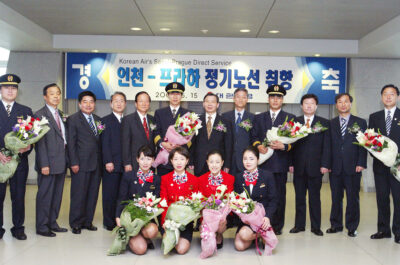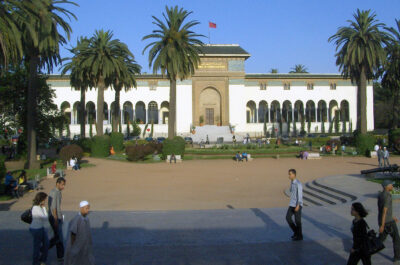Montreal: A global strategy to reinforce the safety and security of international civil aviation, following the tragic events of 11 September in the…
Montreal: A global strategy to reinforce the safety and security of international civil aviation, following the tragic events of 11 September in the United States of America, highlights a year of ground-breaking achievements for the International Civil Aviation Organization (
In his year-end message, the President of the Council of ICAO, Dr. Assad Kotaite, reflects on the determination of the 187 Contracting States of the Organization to ensure that civilian aircraft are never again used as weapons of mass destruction and to restore public confidence in a system that is fundamentally sound.
"The tragic events in which thousands of innocent lives were destroyed have sharpened the resolve of the world civil aviation community to do all that is necessary so that air transport remains the safest and most efficient system of mass transportation ever created," he emphasizes.
"The decisions of the 33rd Session of the ICAO Assembly, held from 25 September to 5 October, along with other key achievements of the past year, provide us with the tools we need to meet the many complex technical, regulatory and economic challenges that lie before us in achieving that goal," he adds.
Aviation Safety and Security
A record 1130 participants from 169 Contracting States and observers from 32 international civil aviation organizations took part in the ICAO triennial Assembly, which endorsed the convening of an international high-level, ministerial conference on aviation security for "preventing, combatting and eradicating acts of terrorism involving civil aviation".
The conference, to be held on 19 and 20 February 2002, is expected to endorse an ICAO Plan of Action for Strengthening Aviation Security and reaffirm the responsibility of States to provide aviation security for their territories.
The Conference will also consider establishing a programme to audit the implementation of ICAO security-related standards in Contracting States; formulating a financial and human resource plan for enhanced ICAO activities in aviation security; strengthening the partnership on aviation security matters between aviation and other authorities, and between government and industry; as well as developing means for restoring public confidence in air travel and the financial health of the air transport industry.
Aviation safety will be strengthened further with the Assembly's approval for expanding the Universal Safety Oversight Audit Programme (USOAP) as of 2004. The Programme consists of regular, mandatory, systematic and harmonized safety audits carried out by ICAO in all 187 Contracting States. Since its creation on 1 January 1999, it has proven effective in identifying and correcting safety deficiencies in areas of personnel licensing and airworthiness and operation of aircraft; it will now include air traffic services, aerodromes and the core elements of accident and incident investigation.
To provide Contracting States with the resources they require to correct deficiencies identified through the USOAP and to implement other safety-related projects, the Assembly endorsed the establishment of an International Financial Facility for Aviation Safety (IFFAS). In addition, because of decreased funding from the United Nations Development Programme (UNDP), the Assembly also agreed to strengthen the ICAO Technical Co-operation Programme, one of the main instruments in providing support to States in remedying deficiencies identified through ICAO's assessment and audit activities. During 2001, the Programme reached a new record high of US 112 million dollars.
The cancellation of war risk insurance of airline operators and other parties following the events of 11 September was addressed by ICAO through the creation, in October, of a special group mandated to develop principles for an appropriate international mechanism in the field of aviation war risk insurance. The Group will meet again early in the new year to finalize its recommendations to the ICAO Council. The President of the Council appealed successfully to Contracting States to extend or provide coverage, as required, until the international mechanism is in place. War risk insurance is required for the granting of operating certificates to airlines.
In another safety-related decision, the Assembly adopted a resolution to deal with the increase over the past few years in the number and gravity of reported incidents involving unruly passengers on board civil aircraft. It calls on all States to enact appropriate laws and regulations, based on a proposed common list of offences and a model jurisdictional clause designed to ensure effective prosecution of perpetrators wherever an act may have been committed.
The Environment
The Assembly endorsed the decision of the ICAO Council for a new, stricter Chapter 4 standard for aircraft noise reduction. The new standard, effective 1 January 2006 for new aircraft design, is based on a recommendation earlier in the year by the Organization's Committee on Aviation Environmental Protection (CAEP). The Assembly also endorsed the concept of a balanced approach to noise management, consisting of four principal elements, namely reduction at source (quieter aircraft), land-use planning and management around airports, noise abatement operational procedures, and operating restrictions on noisy aircraft.
The Assembly also produced a breakthrough on the difficult question of operating restrictions on the noisiest Chapter 3 aircraft. States needing to introduce such restrictions at an airport with severe noise problems will now have a process to enable them to do so. This decision was instrumental regarding the settlement of a difference between the United States and the 15 members of the European Union over the issue of "hush kitted" aircraft.
An international Colloquium on the Environmental Aspects of Aviation held at ICAO Headquarters in April provided a timely context for members of the world aviation community to increase their awareness of the environmental problems associated with civil aviation, exchange views on potential solutions, and to familiarize themselves with the work of CAEP, in preparation for the Assembly.
Air Navigation
A formal agreement was reached on a new air route structure, available as from 1 February 2001, over the North Pole that will considerably cut distances on flights linking North America and Europe to Asia and the Pacific Region. This will result in significantly shorter flight times, more convenient flight schedules, environmental benefits due to reduced fuel burn, and considerable economic advantages to airlines and the flying public.
Economics of Airports and Air Navigation Services
The decision was taken to convene a Worldwide Air Transport Conference on "Challenges and Opportunities of Liberalization", from 24 to 29 March 2003, to develop a framework for the progressive liberalization of international air transport, with safeguards to ensure fair competition, safety and security, and including measures to ensure the effective and sustained participation of developing countries.
International Treaty
An international treaty on financing and leasing of aircraft was signed during a Diplomatic Conference held under the joint auspices of the International Civil Aviation Organization (ICAO) and the International Institute for the Unification of Private Law (Unidroit). The new legal instrument provides for the creation of an international registration system, which will reduce the risks of lending for aircraft financiers, banks and other financing institutions involved in aircraft purchasing and leasing, thus reducing the cost of credit. Financing and leasing costs represent on average about eight per cent of total operating expenses of international scheduled airlines. This is the first time that an international security right is created at the international level, which can be registered internationally and will then be subject to national enforcement.
Budget
The triennial budget of the Organization was established as follows:
2002 – US $56.743.000
2003 – US $57.584.000
2004 – US $60.456.000
Council
A new Council was elected for a three-year term. The 33-member governing body of the Organization includes: Algeria, Argentina, Australia, Brazil, Cameroon, Canada, China, Costa Rica, Cuba, Czech Republic, Egypt, Ethiopia, France, Germany, India, Ireland, Italy, Japan, Lebanon, Mauritius, Mexico, Nigeria, Pakistan, Paraguay, Republic of Korea, Russian Federation, Saudi Arabia, Senegal, Spain, Sweden, United Kingdom, United States and Venezuela.
Dr. Assad Kotaite was elected for a tenth consecutive term as President of the ICAO Council. His new term runs to 2004.
Membership
The Federal Republic of Yugoslavia and the Principality of Andorra became ICAO's 186th and 187th Contracting States.
Awards
The 35th ICAO Edward Warner Award, the highest honour in the world of civil aviation, was conferred on Petro Vasilyevich Balabuyev (Ukraine), in recognition of his eminent contribution to international civil aviation, through his lifetime achievements as an aircraft designer.
ICAO was created in 1944 to promote the safe and orderly development of civil aviation in the world. A specialized agency of the United Nations, it sets international standards and regulations necessary for the safety, security, efficiency and regularity of air transport and serves as the medium for cooperation in all fields of civil aviation among its 187 Contracting States.
Theodore is the Co-Founder and Managing Editor of TravelDailyNews Media Network; his responsibilities include business development and planning for TravelDailyNews long-term opportunities.





















































































































































































